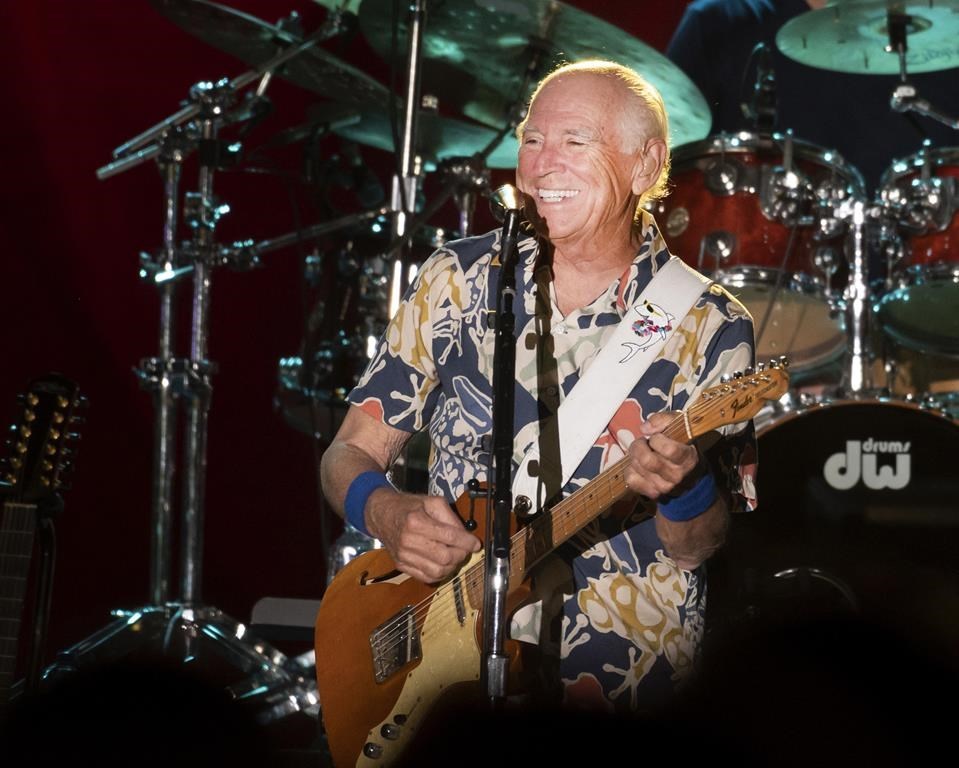Jimmy Buffett celebrated slackers before the word existed, even though he was hardly one himself.
“Wastin' away again in Margaritaville,” went the chorus to his most famous song, which became an international singalong. But Buffett was actually an astute, ambitious, aggressive businessman.
A statement posted to Buffett’s official website and social media pages announced his passing on Friday at age 76. The statement did not say where Buffett died or give a cause. He rescheduled concerts in May and acknowledged he had been hospitalized for an unspecified illness.
Buffett built an empire based largely on Caribbean-flavored pop that celebrated the Florida Keys, sunshine and nightlife. His name became synonymous with a laid-back subtropical party vibe, and his fans were known as Parrotheads.
But behind the laid-back exterior, Buffett was an admitted workaholic. He expanded into novels, nightclubs and many other ventures. At one time his estimated annual income was more than $40 million, and his revenue sources extended far beyond a musician's typical business model of album sales, concert tickets and souvenir T-shirts.
He landed at No. 18 in Forbes’ list of the Richest Celebrities of All Time with a net worth of $1 billion.
The title of Buffett's most popular song showed up on restaurants, clothing, booze and casinos. He became involved in such products as Landshark Lager, the Margaritaville and Cheeseburger in Paradise restaurant chains, boat shoes, salsa, hummus, tortillas, dips, tequila and blenders. The Margaritaville cafe on the Las Vegas strip was said to be the top grossing restaurant in the nation.
Buffett was chairman of Margaritaville Holdings based in Palm Beach, Florida. He had a restaurant and a casino in Vegas, a casino in Mississippi and a hotel in Pensacola Beach, Florida, but the exact scope of his empire was a secret. Margaritaville Holdings LLC didn't disclose its finances, and he usually declined interview requests.
Along with hit songs, Buffett wrote best-selling novels. In 2008 he was ranked by Vanity Fair as No. 97 on a list of the 100 most influential people in the world, and his fan base was broad and loyal. Even when he was in his 60s, his concert tickets fetched more than $100.
"I'm not about to apologize for being a good businessman,” Buffett told The Washington Post in 1998. “Too many people in music have ruined their lives because they weren't. I'm not a great singer, and I'm only a so-so guitar player. I started running the band years ago because nobody else could, and I turned out to be good at this stuff. There's never been any grand plan to this thing. I'm making it up as I go along. ... Just trying to work the system while maintaining my '60s anarchic soul."
Buffett could be more intense than his songs and stage persona suggested. He was injured in 2011 when he fell face-first off the stage while performing in Australia and struck his head, knocking him unconscious. He was released from the hospital the next day.
An avid Miami Heat basketball fan, Buffett caused friction at a 2001 game when he cursed at referee Joe Forte from his courtside seat. Forte ejected him. The Heat moved Buffett and his son to another section.
When then-Heat coach Pat Riley asked Forte if he knew the man he had ejected, Forte didn't recognize the name. He asked if Forte had ever been a Parrothead. “He thought I was insulting him. He wanted to give me a technical,” Riley said.
Buffett was born on Christmas Day, 1946, in Pascagoula, Mississippi. He once said he arrived in the Keys driving a 1946 Packard in about 1970. He found his musical niche during that decade with breezy, island-influenced party tunes. The tone was set with a popular song in 1973, “Why Don't We Get Drunk?"
He became a pop star in 1977, when “Margaritaville" cracked the Top 10. The song has provided a soundtrack to countless happy hours in the decades since.
Buffett's 1992 collection titled “Boats, Beaches, Bars, and Ballads" became one of the best-selling box sets ever and his annual summer concert tours with his Coral Reefer Band became major events, drawing thousands of Parrotheads who would dress up in Hawaiian shirts, leis, funny hats and other mellow party accessories. Some would follow Buffet's tour from city to city.
"We were the social network before there was a social network on the Internet," Buffett told the Dallas Morning News in 2012. “They had something in common; they shared things. They started dressing up because they were listening to the music. It was the common bond.”
Business success soon eclipsed record sales. According to Buffett's website, the first Margaritaville opened in Key West, Florida, in 1987. The chain grew to 16 outlets and Harrah's Entertainment, Inc., teamed up with Buffett to develop the $700 million Margaritaville Casino & Resort in Biloxi, Mississippi, near where he was raised.
Regardless of his commercial achievements, Buffett's legacy will be, in his words, “helping people forget their troubles for a couple of hours.”
The singer told the Baltimore Sun in 1999 that his optimistic view of life brought fans to the humor and escapism in his work. And that was okay, because there already was enough serious material in the world.
“I was the life of the party,” Buffett said.
Don Schanche Jr., The Associated Press


